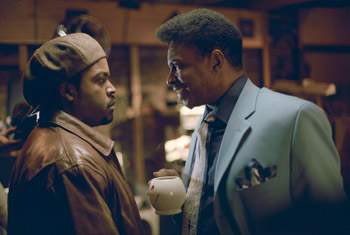![[Metroactive Movies]](/movies/gifs/movies468.gif)
[ Movies Index | Show Times | Silicon Valley | Metroactive Home | Archives ]
In the Ghetto
The comedy 'Barbershop' follows 12 hours in the life of a Chicago neighborhood
By Richard von Busack
DIRECTOR TIM STORY'S film Barbershop is nothing that a couple of gag writers--or maybe the addition of some sort of personal experience--couldn't have fixed. Despite the authentic Chicago locations, the film seems a long ways removed from ghetto life. At its center is yet another vague performance by Ice Cube, an actor whose chief skill seems to be a gentle tolerance of the presence of the camera. Ice Cube (the name is meant to be ironic, isn't it? His range goes from nice guy to teddy bear) plays Calvin, a dreamer who inherited his father's barbershop. Looking to get out, he sells the property to the neighborhood loan shark, Lester Wallace (Keith David enjoying himself hugely--flashing a toothy Cesar Romero smile and punctuating his threats with satisfied sighs).
In the meantime, the robbery of a cash machine down the street has set the police scurrying around (rather a lot of police for a routine burglary). Their main suspect is Ricky (Michael Ealy), a regular at the shop, but the real burglars, a pair of inepts (Anthony Anderson and Lahmard Tate), are hauling around the ATM machine searching for tools to crack it open.
Calvin hides the news of the impending sale of his shop from his employees. The barbers include pretty much the only woman in the film, Ruff Ryders rapper Eve as an ornery barber named Terri. The other staffers are a college-educated hothead (Sean Patrick Thomas), a Nigerian (Leonard Earl Howze) and a roundly disliked wigga named Isaac (Troy Garity), who gets in the self-justifying line "I'm blacker than you, man," which is meant to cheer up the white audience for this movie. (The same line appears in The Château, and it sounds just as bad there.)
The film's highlight is Cedric the Entertainer, made up as a gray-haired geezer in a plastic smock whose full-time occupation is laying down the law from his chair. Cedric livens up Barbershop same way that Richard Pryor's 10 or 15 minutes used to carry some other old-school ensemble comedies, like Car Wash. Except for the moment where he does a priestly blessing of a girl's big butt with a chicken bone, Cedric's best routine is about rewriting African American history. In his view, Rosa Parks was a woman who wanted nothing more and nothing less than just a seat on the bus. However, when Cedric starts delivering lines like "We don't need reparations, we need responsibility," the upper-class tinge of this supposedly lower-class movie is revealed.
Barbershop is meant as a fluffy sitcom, but it keeps its fluffiness by willfully ignoring a lot of problems. From this film, you'd think the real problem in the ghetto was people not pulling themselves up by their own bootstraps and get-rich-quick schemes--like Calvin's plan to start a recording studio or the ATM robbery. Barbershop is a dated, out-of-touch film about a way of life without much future in it. Most fans will only note that it's just not nearly funny enough. When Terri tries to shut up some jokesters by saying, "This ain't Def Comedy Jam," it's like "You're telling me."
[ Silicon Valley | Metroactive Home | Archives ]
![]()

Cool Hands: Ice Cube discusses financial arrangements with Keith David's loan shark in Tim Story's 'Barbershop.'
Barbershop (PG-13; 102 min.), directed by Tim Story, written by Mark Brown, Don D. Scott and Marshall Todd, photographed by Tom Priestly and starring Ice Cube, Michael Ealy and Cedric the Entertainer, opens Friday at selected theaters valleywide.
Send a letter to the editor about this story to letters@metronews.com.
From the September 12-18, 2002 issue of Metro, Silicon Valley's Weekly Newspaper.